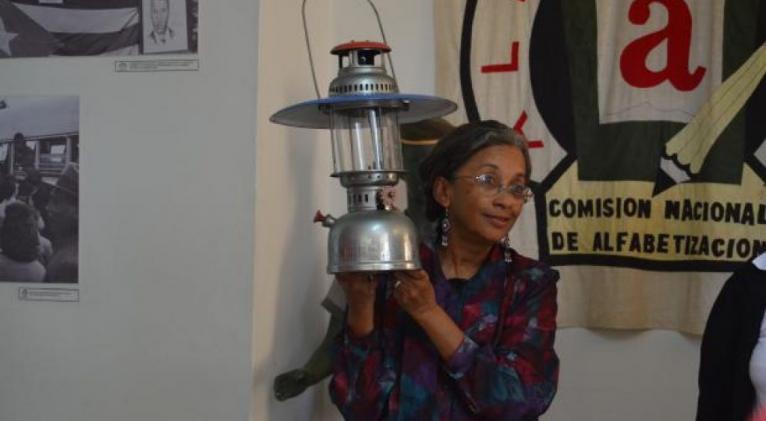How Cuba became more literate than the United States
especiales

According to the CIA Factbook – that’s right, the CIA – Cuba is a more literate society than the United States. Cuba is rated fifth in the world in literacy. The United States, a mere 22nd. UNESCO, the United Nations Educational, Scientific and Cultural Organization, confirms the CIA’s assessment of Cuban literacy.
Yet, what most U.S. citizens don’t know is how the Cuban went from being one of the least literate nations in the world in 1959 under the brutal dictator and mob-front Batista.
With Cuba’s literacy rate at a staggering low 23 percent in 1960, Castro appeared before the United Nations on September 20 and proclaimed the people of Cuba would eliminate illiteracy in a year. They succeeded.
I had the privilege of visiting Cuba’s National Literacy Museum on February 10th , 2015. It is housed in an old military base, the one Batista fled Cuba from with the CIA and mob over New Year’s in 1959-1960. It is the only literacy museum in the world.
I couldn’t help but reflect that I live in Columbus, Ohio, where the Superintendent of Columbus City Schools just pled “no contest” to the falsification of student grade records. Her top level administrators and principals engaged in a practice called “D’in them up.” This meant passing students who were failing and, in some cases, never attended classes. Of course our corporate capitalist system rewarded the superintendent and her administrators with hard cash for the reports of falsified performances. The superintendent pled guilty to a misdemeanor. One can only wonder what you would have to do when destroying children’s futures to earn a felony.
Instead of cheating and falsifying records, in January 1961 the Cubans took a different approach. They mobilized over 100,000 urban students and deemed them “voluntary literacy teachers.” The students ranged in age from nine to sixteen. Shockingly, in 1960s Cuba 52 percent of the voluntary teachers were female, in an era where chaperones were mandatory.
This unprecedented historical achievement has been captured in a documentary entitled “Maestra [Teacher].” We saw the film and met the filmmaker Catherine Murphy. She had interviewed several women who, as young people, had volunteered for the literacy campaign, most to the consternation of their parents. Two of her subjects spoke to our group about how liberating it was to be allowed to sacrifice and volunteer for a noble cause. Both also talked about how difficult it was, and the maneuvers necessary, to get their parents’ permission to leave home for the countryside.
Joining the urban students were retired teachers, housewives and 14,000 urban Cuban workers. This army of 268,000 headed off to the conquer illiteracy.
The philosopher William James argued that in order to move away from our impulse toward war, we must mobilize for a moral equivalent. The Cuban’s did just that.
Other countries, of course, contributed. China sent tens of thousands of oil lamps so teaching could go on in the evening in rural areas that lacked electricity. The Soviet Union donated books, paper and pencils. Volunteers from Spain, France, Italy and all over Latin America joined the crusade.
The United States and their ex-patriate Cuban allies responded to the literacy campaign by attacking Cuba in the notorious Bay of Pigs incident. In all, ten literacy volunteers were killed by counter-revolutionary forces loyal to Batista and backed by the U.S.
Cuba is proud of its accomplishments in literacy and tracks the progress of the formerly illiterate. Three who were taught in 1961 went on to be college professors.
By the end of 1961, 268,000 Cubans, out of a population of 6 million, were literacy volunteers at some time – including our 71-year-old bus driver Rene. He had begun training and was called away for military service because of the U.S. invasion.
In 1961, Castro was able to announce the United Nations that over 707,000 Cubans had learned to read and write that year. The oldest person to be taught reading and writing was 108. Another was 106.
Cuban literacy volunteers have gone on to volunteer in rural areas of Mexico, Brazil, and in East Timor – the latter country having suffered one of the worst genocides in modern times at the hands of the U.S-backed and trained forces from Indonesia.
Our corporate for-profit media spends a lot of time keeping the public illiterate as to the realities of Cuban history and the brutal nature of the U.S. blockade. In that same way Columbus’ superintendent and her cronies “D’ed” students up for profit, our for-profit media dumbs us down on the virtues of our neighbor to the south.
The Free Press will screen “Maestra” at the March 14, 2015 Second Saturday Salon, 1021 E. Broad St., 6:30pm-midnight. The film will play around 7:30pm followed by a discussion by Bob Fitrakis and Suzanne Patzer, who recently visited Cuba.













Add new comment